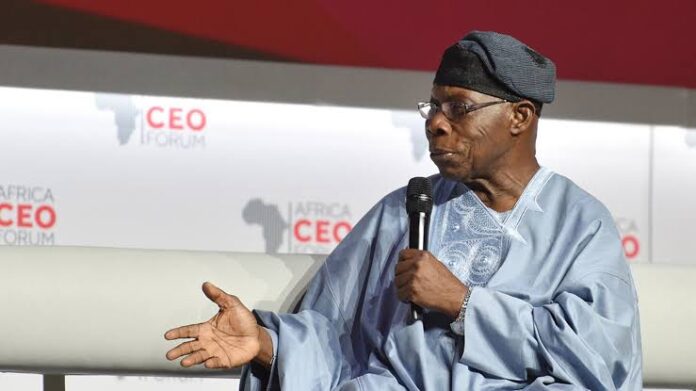Former President Olusegun Obasanjo has expressed deep concern over the state of governance in Nigeria, lamenting that the country has become a “burial ground for policies.” Obasanjo, who was speaking at an event in Abuja, warned that while Nigeria is not lacking in policies, the failure to implement them has stifled progress.
Obasanjo did not mince words as he addressed an audience at the Olusegun Obasanjo Space Centre during the 8th Engr Brig Gen (rtd) Micheal Agu Annual Distinguished Lecture and Awards. His sharp criticism of Nigeria’s policy failures reflected his frustration with the country’s inability to move forward despite having the right ideas on paper.
In a striking metaphor, the former president painted a picture of a nation trapped in a cycle of setbacks. He stated, “We are not short of policies in Nigeria. Unfortunately, Nigeria has become a burial ground of policies that are either unimplemented or unexecuted.”
Obasanjo went on to explain that progress is not made through mere intentions or statements but through deliberate actions. “Those who make progress do so not because they wish to, but because they take action. Sadly, we take two steps forward and three steps backward in every aspect of our national life.”
This comment struck a chord with many Nigerians who have long criticized the government’s inability to follow through on important initiatives. The former president’s frustration echoed the sentiments of many who feel Nigeria has repeatedly squandered opportunities for growth and development.
Obasanjo’s remarks come at a time when Nigeria faces numerous challenges, including economic struggles, rising insecurity, and a growing sense of disillusionment among citizens. The failure to implement critical policies has become a recurring theme in the country’s governance.
From power sector reforms to healthcare initiatives, Nigeria has seen many ambitious projects stall due to poor planning, corruption, and a lack of political will. One example is the much-talked-about National Development Plans, which have been drawn up over the years but rarely fully implemented. These plans, designed to transform key sectors of the economy, often fall victim to the same pattern: lofty goals on paper, followed by a failure to translate them into reality.
The former president’s words also highlight how successive governments have struggled to make meaningful progress, despite having well-laid plans. Obasanjo’s administration, which spanned from 1999 to 2007, launched several reforms aimed at tackling corruption, improving infrastructure, and diversifying the economy. However, many of these reforms were either rolled back or abandoned by subsequent administrations.
Obasanjo spoke at the event in Abuja not just as a critic but also as someone who had once envisioned Nigeria taking a leading role in space technology. During his presidency, the National Space Research and Development Agency (NASRDA) was established to make Nigeria a significant player in space exploration.
Obasanjo revealed that his administration had plans to launch multiple satellites into space. “We had a vision to launch Nigeria’s first satellite with China, the second in collaboration with China, and the third satellite to be made entirely by Nigerian engineers,” he stated.
This ambitious plan was aimed at boosting Nigeria’s technological capacity and placing the country on the global stage in space exploration. However, Obasanjo lamented that the program lost momentum after he left office. “I heard at some point that NASRDA couldn’t even pay its workers,” he said regretfully.
This revelation highlights another case of Nigeria’s potential being squandered due to a lack of continuity in governance. Over 100 Nigerian engineers were sent to China during Obasanjo’s administration to receive specialized training in space technology. Yet, the dream of Nigeria building its own satellite remains unfulfilled, a stark example of how far the country has strayed from its early ambitions.
Obasanjo’s criticism of Nigeria’s policy failures extended beyond the space sector. He spoke about how the lack of action impacts every area of national life, from education to healthcare and infrastructure. The former president pointed out that Nigeria cannot expect to make progress if it continues to scatter its efforts and fail to follow through on key initiatives.
“We cannot be jack of all trades and master of none,” he said, calling for a more focused approach to governance. Obasanjo emphasized that Nigeria must identify the policies it can realistically implement and put all its energy into ensuring their success.
He emphasized that progress will remain elusive as long as policies continue to be abandoned.
“Nigeria has everything it needs to succeed, but we must carry out the plans we have,” he stressed. “Wishing for progress is not enough. We need to act.”

